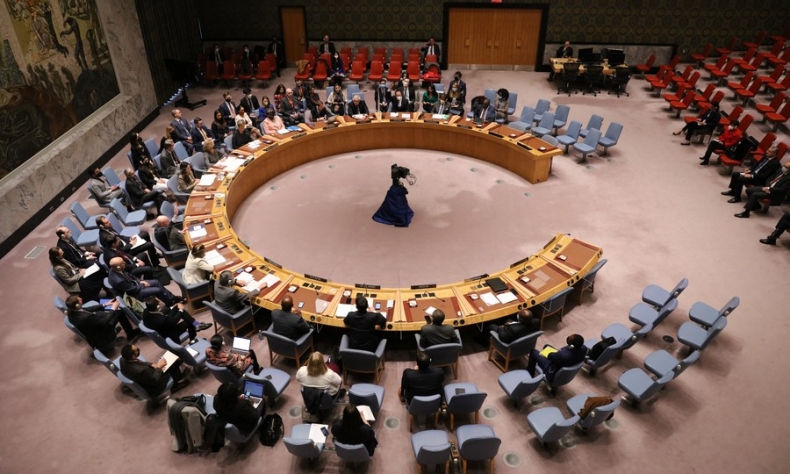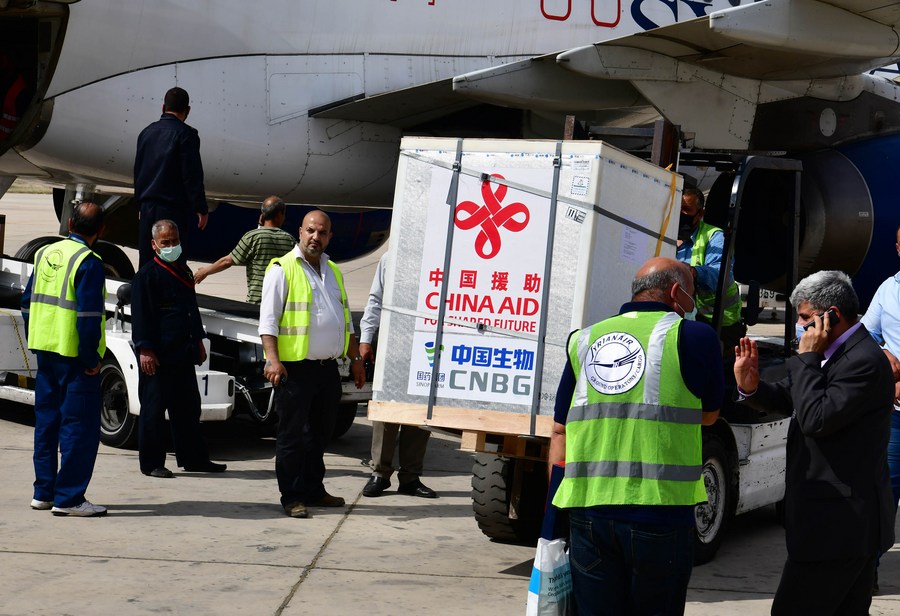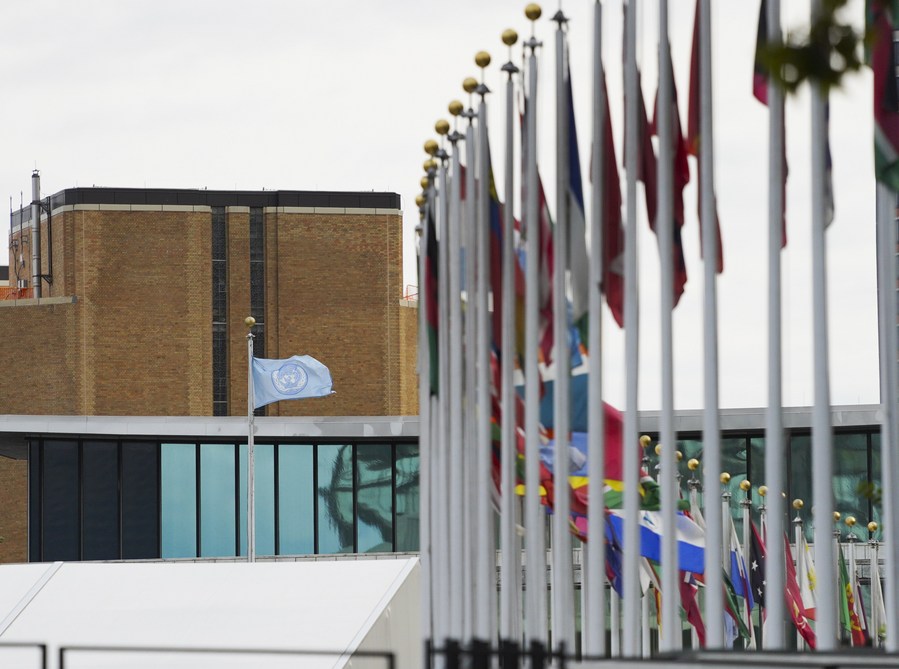China’s Approaches to World Development and Peace

Human history has proven time and again that without peace, development is a fountain without water; without security, prosperity is a tree without roots.
The COVID-19 pandemic has not yet dissipated, the Ukraine crisis is still dragging on, traditional and non-traditional security threats are continuing to be superimposed on each other, and peace and development are being severely challenged.
At this critical moment in history when the future of humankind is at stake, Chinese President Xi Jinping proposed the Global Development Initiative (GDI) during the general debate of the 76th session of the United Nations General Assembly which he attended by video in September 2021. He went on to propose the Global Security Initiative (GSI) at the opening ceremony of the Boao Forum for Asia Annual Conference 2022 held in April this year.
China maintains that development is the key to solving all problems and safety is the prerequisite for development. The two initiatives, which echo and supplement each other, are China’s approaches to promoting world peace and development. They are also the latest public goods given by China to address international security challenges and promote stable and long-term global development.
Development and prosperity
Regardless of how the international situation changes, people of all countries share the same yearning to enjoy a better life and pursue development. The importance and urgency of development have become more prominent.
The 2030 Agenda for Sustainable Development, which charts a new era of sustainable development until 2030, was adopted by the 193 UN member states in September 2015. Aiming to eradicate extreme poverty, overcome inequality and injustice, and curb climate change, the agenda sets 17 sustainable development goals for the next 15 years and calls on countries around the world to take it as a guide for implementing relevant actions.
However, the changing global situation has been brought under the shadow of the pandemic. The recovery of the global economy has suffered setbacks, the development gap between the North and the South has widened, and the momentum of development cooperation has weakened. The cause of international development has now come to a crossroads.

The fact that global poverty remains severe is cause for much distress and regret. According to statistics from the year 2021, there are more than 700 million people living in extreme poverty on less than US $1.9 per person per day, accounting for 9.2 percent of the global population, and there are more than 3.29 billion people living on less than US $5.5 per person per day, accounting for 43.3 percent of the global population. Some developing countries have slipped back into poverty and chaos due to the pandemic, and many people living in developed countries have also fallen into difficult times in which they cannot provide for their families.
In this circumstance, President Xi put forward the six-pronged GDI, which includes staying committed to development as a priority, a people-centered approach, benefits for all, innovation-driven development, harmony between humans and nature, and results-oriented actions.
On February 5, at a meeting with UN Secretary-General António Guterres, on the sidelines of the Beijing 2022 Winter Olympics, President Xi said that the GDI is highly consistent with the 2030 Agenda for Sustainable Development, and aims to promote stronger, greener, and healthier global development. China promises to work closely with the UN to make joint progress in reaching this end.
The international community responded positively to the GDI, with more than 100 countries expressing their support, fully demonstrating that the GDI conforms to the historical trend as well as meets the needs and aspirations of various countries.
On May 9, the UN held a high-level video conference of the Group of Friends of the Global Development Initiative. All parties at the meeting believed that the initiative will strongly encourage the international community to refocus on development and accelerate the implementation of the 2030 Agenda.
China has always firmly believed that development is the key to solving every problem, sustainable development is desirable development, and common development is real development. In the face of crises and challenges, China is committed to building a consensus on global development and continues to pay attention to key areas of global development such as poverty reduction, infrastructure construction, education, and public health. China proposed the Belt and Road Initiative, actively promoting the building of an open world economy. It also helps other developing countries better integrate into global industrial and value chains, and advocates the development philosophy of innovation, coordination, green, openness, and sharing.
The core concept of the GDI is being people-centered. The pandemic has severely interrupted the global development process. While facing the severe challenges of the disease at home, China has never forgotten the plight of other countries especially other developing countries. The UN has put forward the goal of vaccinating 70 percent of the world’s population by the middle of this year. In response, China has clearly expressed its full support and fulfilled its commitment to provide two billion doses of vaccines in 2021. It will continue to provide anti-pandemic assistance to other developing countries in the future.

Peace and stability
Peace has always been the expectation of peoples of all countries in the world. Human history has proven time and again that without peace, development is a fountain without water; without security, prosperity is a tree without roots.
At present, the world is neither peaceful nor stable, regional security issues are emerging one after another, and the Russia-Ukraine conflict has attracted global attention. The threats of unilateralism, hegemonism, and power politics are on the rise, and the deficit in peace, security, trust, and governance are in a state of steady decline. The increasing security challenges facing human society seem to be more intractable. This situation should not continue, because it harms historical progress and the safety and well-being of humankind.
Against this background, President Xi has put forward the GSI for the future of all humankind.
Xi said it is important to stay committed to the vision of common, comprehensive, cooperative, and sustainable security, and work together to maintain world peace and security; stay committed to respecting the sovereignty and territorial integrity of all countries, uphold non-interference in internal affairs, and respect the independent choices of development paths and social systems made by people in different countries; stay committed to abiding by the purposes and principles of the UN Charter, reject the Cold War mentality, oppose unilateralism, and refuse to grapple in group politics and bloc confrontation; stay committed to taking the legitimate security concerns of all countries seriously, uphold the principle of indivisible security, build a balanced, effective, and sustainable security architecture, and oppose the pursuit of one’s own security at the cost of someone else’s security; stay committed to peacefully resolving differences and disputes between countries through dialogue and consultation, support all efforts conducive to the peaceful settlement of crises, reject double standard, and oppose the wanton use of unilateral sanctions and long-arm jurisdiction; stay committed to maintaining security in both traditional and non-traditional domains, and work together on regional disputes and global challenges such as terrorism, climate change, cybersecurity, and biosecurity.
The GSI is another international public good which China has provided. It is the application of the concept of a global community of shared future in the security field.

At the CICA (Conference on Interaction and Confidence-Building Measures in Asia) Shanghai Summit in 2014, President Xi proposed for the first time the concept of common, comprehensive, cooperative, and sustainable security, and it has won widespread recognition and support from the international community.
Respecting the sovereignty and territorial integrity of all countries is the basic prerequisite for effectively maintaining world peace and stability. China always insists that all countries, big or small, strong or weak, rich or poor, are equal members of the international community, that there is no room for interference in the internal affairs of any country, that sovereignty and dignity must be respected, and that the right to independently choose social systems and development paths must be upheld.
Today a few countries have wantonly introduced unilateral sanctions and long-arm jurisdictions, insisted on building “parallel systems,” generalized the concept of national security, and suppressed and contained the economic and technological development of other countries. This has further exacerbated the difficulties of people’s livelihoods in every country of the world, especially developing countries.
History has repeatedly warned us that being domineering and bullying the weak are the causes of turmoil, while the law of the jungle and the logic of power are the source of war. In the face of a rapidly changing world, countries around the world should firmly uphold the UN’s authority and status, jointly practice true multilateralism, oppose using ideology to incite confrontation and division, oppose cliques and factions, oppose undermining the international order in the name of so-called “rules,” and oppose dragging the world into a new Cold War.
Major countries have special and important responsibilities to resolve international and regional hot issues. When dealing with such issues, China has always adhered to dialogue and consultation, and firmly acted as a mediator. China firmly stands on the side of peaceful dialogue and justice, and actively explores solutions with Chinese characteristics.
On the Ukraine issue, China has been highly recognized by the international community, especially the vast number of developing countries for abiding by objectivity and fairness, and actively promoting peace talks.
Humanity is an extended family with a shared destiny, in which countries share each other’s wax and wane by being closely interlinked. To move toward a better future, the most powerful drive is to work together, and the most effective method is to pull together for a common cause. Likening countries around the world to “passengers aboard the same ship who share the same destiny,” President Xi called on “all passengers” to pull together to help the ship navigate through the storm and sail toward a bright future.
China is committed to being an active builder of world peace, a defender of the international order, and a mediator of hotspot issues, and will work with the international community to seek common development.
 Facebook
Facebook
 Twitter
Twitter
 Linkedin
Linkedin
 Google +
Google +










